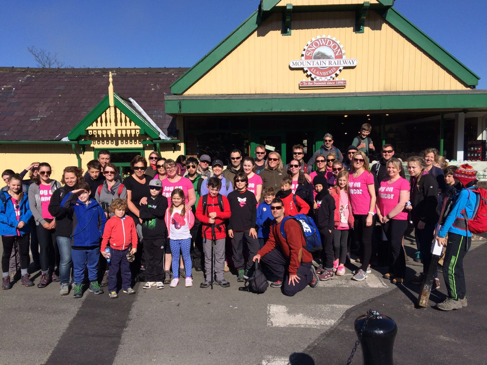
I was diagnosed with primary and secondary breast cancer in March 2015. The first couple of months were spent being directed by medical staff (they were amazing!). I had two operations, a corpectomy and a hip replacement. I was prescribed various medications for cancer, pain relief and to induce menopause. I felt very powerless.
Forward on four and a half years, and I feel great most of the time. I have a wonderful family and supportive friends. From the outside I would appear “normal”, but I do suffer from fatigue and have constant aches and pains from the bone mets.
I am a research student, and when I started to read about the latest research on breast cancer, I started to feel like I could regain some control. I want to write a blog post for those people, who have recently been diagnosed, so that they can quickly gain some useful information on secondary breast cancer. My friend Dr Lisa Lee-Jones (Manchester Metropolitan University), who specialises in cancer biology, has been a huge help in gathering useful links and research. Here, I will summarise some of the useful information.
To find out more information on your cancer sub-type (mine is ER+ HER2-) https://www.macmillan.org.uk/information-and-support/breast-cancer/treating/treatment-decisions/understanding-your-diagnosis/receptors-for-breast-cancer.html . The receptor status helps clinicians determine which drugs are likely to work, using “molecular targeted” treatment. The targeted treatments are newer types of treatments and don’t have the side effects traditionally associated with chemotherapy because they target the genetic defect of the tumour and leave the normal cells alone. I was prescribed hormone treatments, but I also decided to have a second opinion, which every patient is entitled to via your gp. I requested to go to The Christies in Manchester.
https://www.christie.nhs.uk/professionals/research/research-themes/breast-cancer-research-team/ . I discovered this private clinic, through a friend on facebook. They prescribe medication to take in conjunction with your standard treatments. http://careoncologyclinic.com/. When I took any additional medication, I always spoke to my gp or oncologist.
I wanted to know about treatment options and trials. I also wanted to know about where research was leading in this field. Here are some further links that you may find useful:
- Medical News Today is an excellent resource which summarises research in an accessible way. Here is an interesting article on aspirin.
http://www.medicalnewstoday.com/ - National Institute of Clinical Excellence provides recommended guidance for treatments-this is meant to standardise treatment across the UK (to avoid the postcode lottery that existed for expensive treatments previously):
http://www.nice.org.uk/
https://www.nice.org.uk/search?q=metastatic+breast+cancer - At some point, we may want to do some trials. The following link gives information on clincial trials, including the four different phases:
http://www.macmillan.org.uk/information-and-support/treating/clinical-trials/what-does-a-clinical-trial-involve. - Clinical trials can be found at:
https://bepartofresearch.nihr.ac.uk/ - British National Formulary which provides information on medicines and is available free of charge:
https://www.evidence.nhs.uk/formulary/bnf/current - A good cancer app. It contains the Cancer Guidelines by the European Society for Medical Oncologists:
https://play.google.com/store/apps/details?id=com.appyzz.android.esmo - Diet and exercise is one area that can improve lifestyle for women with secondary breast cancer. My spinal surgeon told me to walk every day to improve bone density and posture. My oncologist suggested that I take up yoga or pilates. I have also seen a nutritionist and I am now on a low carb and high vegetable diet and taking a range of supplements. The food for breast cancer website is an excellent resource, with evidence-based information on food and supplements. http://foodforbreastcancer.com/
- I decided to get my tumour profiled. This is expensive, but it will tell me which drugs should be successful. There is a general move towards a more individualised approach to cancer treatment. Tumour profiling information: http://www.carismolecularintelligence.com/cancer_biomarker_therapy
- For emotional support, I turned to the facebook groups “Younger Breast Cancer Network” and “Secondary Breast Cancer Support Group”. I hope this blog post helps you.
Written by Beth Roberts and Dr Lisa Lee-Jones
